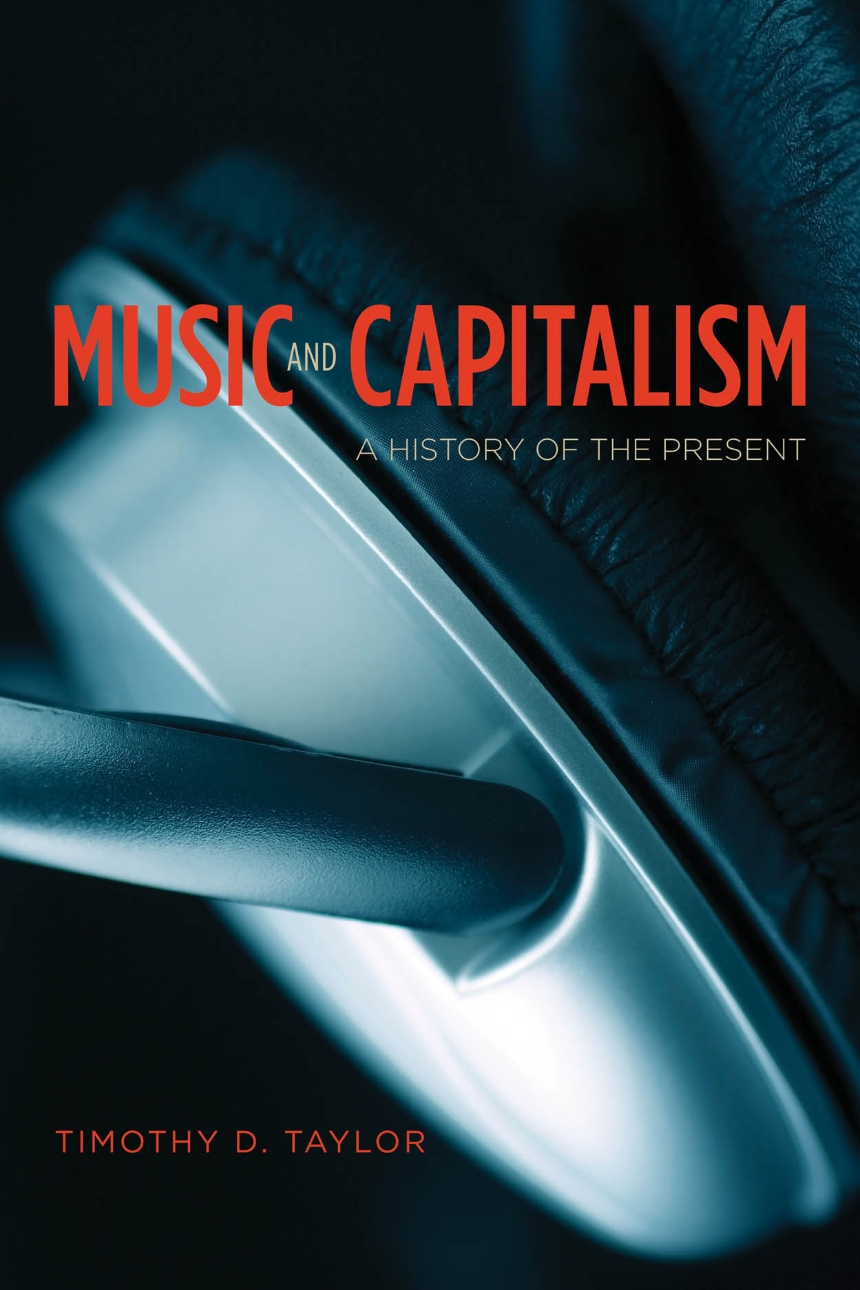Music and Capitalism
A History of the Present
iTunes. Spotify. Pandora. With these brief words one can map the landscape of music today, but these aren’t musicians, songs, or anything else actually musical—they are products and brands. In this book, Timothy D. Taylor explores just how pervasively capitalism has shaped music over the last few decades. Examining changes in the production, distribution, and consumption of music, he offers an incisive critique of the music industry’s shift in focus from creativity to profits, as well as stories of those who are laboring to find and make musical meaning in the shadows of the mainstream cultural industries.
Taylor explores everything from the branding of musicians to the globalization of music to the emergence of digital technologies in music production and consumption. Drawing on interviews with industry insiders, musicians, and indie label workers, he traces both the constricting forces of bottom-line economics and the revolutionary emergence of the affordable home studio, the global internet, and the mp3 that have shaped music in different ways. A sophisticated analysis of how music is made, repurposed, advertised, sold, pirated, and consumed, Music and Capitalism is a must read for anyone who cares about what they are listening to, how, and why.
Taylor explores everything from the branding of musicians to the globalization of music to the emergence of digital technologies in music production and consumption. Drawing on interviews with industry insiders, musicians, and indie label workers, he traces both the constricting forces of bottom-line economics and the revolutionary emergence of the affordable home studio, the global internet, and the mp3 that have shaped music in different ways. A sophisticated analysis of how music is made, repurposed, advertised, sold, pirated, and consumed, Music and Capitalism is a must read for anyone who cares about what they are listening to, how, and why.
240 pages | 11 halftones, 1 line drawing, 3 tables | 6 x 9 | © 2015
Anthropology: Cultural and Social Anthropology
Music: Ethnomusicology, General Music
Philosophy: Aesthetics
Sociology: Theory and Sociology of Knowledge
Reviews
Table of Contents
List of Figures
List of Tables
List of Audio and Video Examples
Acknowledgments
Introduction: Capitalism, Music, and Social Theory
List of Tables
List of Audio and Video Examples
Acknowledgments
Introduction: Capitalism, Music, and Social Theory
Music and Capitalism
Western Neoliberal Capitalism as a Cultural System
What Follows
Western Neoliberal Capitalism as a Cultural System
What Follows
1 A Brief History of Music and Capitalism before the Rise of Neoliberalism
Production of Musical Commodities
Capitalism and Musical Production
Artisans, Artists, Geniuses
Social Class, Markets, and Cultural Consumption
Social Class, Markets, and Cultural Consumption
Youth
Conclusions
2 Neoliberal Capitalism and the Cultural Industries
Ideologies of Neoliberal Capitalism
The Cultural Industries as Industries
2 Neoliberal Capitalism and the Cultural Industries
Ideologies of Neoliberal Capitalism
The Cultural Industries as Industries
Brands and Branding
The Conquest of Cool— and the Culture
New Social Classes: The New Petite Bourgeoisie
Increasing Commodification
Consumption and/as Identity- Making
Plenitude
Music Supervisors
Search
Sociality
Search
Sociality
Art and Commerce
Advertising as Harbinger of the Present
3 Globalization
Globalization, Neoliberal Capitalism, and the International Music Industry
The Rise of “World Music”
Shifting Authenticities
Connoisseurs, Collaborators, Curators
Collaboration without Collaborators
Musicians in the Field of World Music in Neoliberal Capitalism
Case Study: Angélique Kidjo
Kidjo and “World Music”
Positions and Forms of Capital in the World Music Field
Gender
Oremi (1998)
Later Recordings
Positions and Forms of Capital in the World Music Field
Gender
Oremi (1998)
Later Recordings
Ownership
4 Digitalization
New Sound Technologies: DIY Everything?
Remixing, Co- Creating
4 Digitalization
New Sound Technologies: DIY Everything?
Remixing, Co- Creating
New Forms of Labor?
The Changing Nature of Work in the Commercial Music Industry
Longer, Harder
Digitized Music as a New Form of Music Objectified
Tactility
Ambivalences and Critiques
5 Singing in the Shadows of Neoliberal Capitalism
Motivated by Music
Burger Records: “Keeping the Teenage Spirit Alive”
6 Conclusions: Capitalism Is People, Too
Value in the Informal Logic of Actual Life
Notes
References
5 Singing in the Shadows of Neoliberal Capitalism
Motivated by Music
Burger Records: “Keeping the Teenage Spirit Alive”
6 Conclusions: Capitalism Is People, Too
Value in the Informal Logic of Actual Life
Notes
References
Unpublished Materials
Interviews
Other Unpublished Materials
Other Unpublished Materials
Discography
Filmography
Books and Articles
Filmography
Books and Articles
Index
